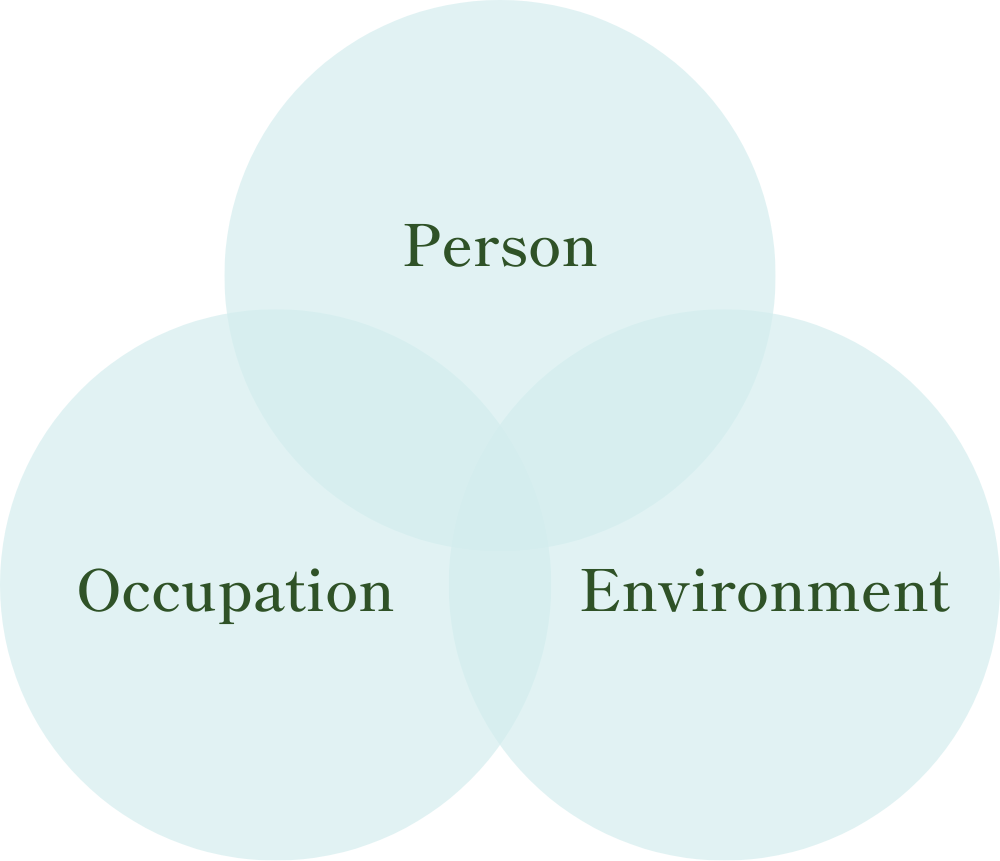

Occupational Therapy (OT) is a healthcare profession focused on helping individuals participate in meaningful activities or occupations that are essential for daily living. These activities range from self-care tasks like dressing and eating to work, leisure and social activities. Occupational therapists work with people of all ages who may have physical, developmental, emotional, or cognitive challenges that affect their ability to engage in these activities.

By considering the dynamic interplay between you as the person, the activities you want or need to do (occupations), and the environments in which you perform these activities, occupational therapy aims to enhance your independence, well-being, and overall quality of life.
The goal of occupational therapy is to enable you to live as independently as possible and to improve your quality of life. Therapy can be provided in various settings, including at home, school, in the workplace, in the community, and online via teletherapy.
We work collaboratively with people to provide evidence-based, individualised support in the following areas:
The OT begins by conducting a comprehensive assessment to understand your strengths, challenges, goals, and the impact of your disability on your daily life activities. This assessment may include observing your performance of various tasks, interviewing you and your caregivers, administering standardised assessments, reviewing medical records and speaking to other stakeholders.
Based on the assessment findings and discussions with you, the OT will collaborate with you and your caregivers to set meaningful and achievable goals. These goals could include improving independence in self-care tasks, enhancing participation in school or work activities, increasing social interactions, or improving mobility and community access.
The OT develops an individualised intervention plan tailored to your specific needs and goals. This plan may involve a combination of therapeutic activities, skill-building exercises, environmental modifications, assistive technology recommendations, and training for caregivers or support workers.
OT sessions can differ depending on identified goals and intervention plans. It can include training in activities of daily living (such as dressing, grooming, and eating), fine and gross motor skills development, cognitive skills training, sensory integration therapy, and social skills training. It can also include assistive technology trials, and education and training to your support network.
The OT may write reports, also known as Functional Capacity Assessments, if required, to provide detailed descriptions of your functional capacity, including your strengths, limitations, and any barriers to participation in daily activities. They also identify the types of supports and services you may require to maximise your independence, safety, and quality of life. This information helps guide the allocation of NDIS funding and resources.
Throughout the intervention process, the OT continually monitors your progress towards your goals, adjusts the intervention plan as needed, and collaborates with you and your support network to ensure that your needs are being met effectively.
Before our Initial Meeting:
Initial Assessment:
Ongoing Therapy Intervention Sessions:
Reports as required:
Please keep in mind that all participants have different funding, needs, and complexities. This serves as a guide for Occupational Therapy Services.
| Billable tasks: | What is involved: |
|---|---|
| Initial Occupational Therapy Assessment |
|
| Therapy Intervention Sessions |
|
| Progress Notes |
|
| Therapy Treatment Plan |
|
| Session planning/ Resource Creation/ Sourcing equipment and arranging trials |
|
| Plan Review Report |
|
| Support Letters |
|
| Functional Capacity Assessments |
|
| Assistive Technology sourcing, applications, and report-writing |
|
| Home Modifications sourcing, applications, and report-writing |
|
| Communication With Relevant Stakeholders (as required) |
|
| Multidisciplinary Team Meetings (as required) |
|
| Travel Time To Participant |
|
| Travel Distance To Participant |
|